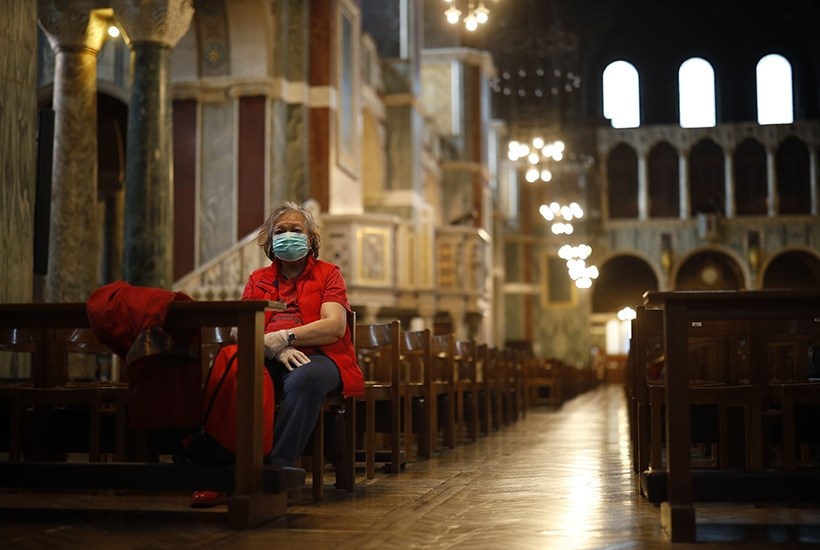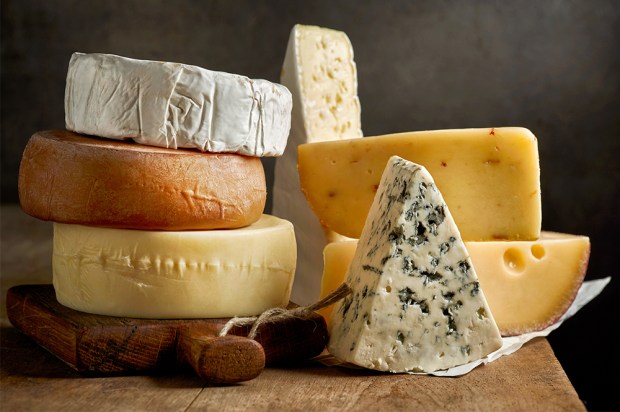Monday night’s murderous gunman in Vienna is officially described as ‘Islamist’. Brahim Aioussaoi, the man accused of murdering worshippers in a Nice cathedral last week, arrived (reported the BBC) with ‘three knives, two phones and one Quran’. These would seem to be the basic toolkit required. A friend who lives in southern France tells me that although the latest lockdown measures prevent church services being held, so serious is the terrorist threat to churches that many are guarded by police. So it seems natural that President Macron of France warns of the danger to French Catholics and speaks of ‘Islamist terrorist folly’. Each of his three chosen words rings true, and the link between them cannot be avoided. Even the BBC appears to have dropped its policy of calling such terrorists mere ‘militants’. Yet Macron’s words — and his repeated defence of the publishing of cartoons of Mohammed — have produced furious demonstrations by Muslims across the world, including many who are described as moderate. I think I understand why such Muslims might think their religion misrepresented. Critics like to pull out a few bloodthirsty Quranic texts without understanding wider scriptural and traditional contexts. You can play this game with any ancient religion, including Christianity and Judaism, and it is unfair. However, Muslim organisations look ridiculous — and worse — if they devote their energies after atrocities to stigmatising legitimate criticism as ‘Islamophobia’, thus trying to chill free speech. They evade the fact that the Islamist perpetrators are serious believers, shouting ‘Allahu Akbar’ as they kill (and often die) for their God. The extremists arise from worldwide movements, drawing on ideologies with huge followings, such as that of the Muslim Brotherhood. In a tweet, the Archbishop of Canterbury spoke of the ‘godlessness’ of the Nice attack. But surely these people are not godless: they are fanatics who misunderstand what their God teaches. So moderate Muslims cannot just say ‘Nothing to do with us’. It is very much to do with their failure to lead Islam’s path through modernity.
When Twitter Safety took down President Trump’s tweet that the Democrats were ‘trying to steal the election’ we learnt for certain that Twitter is now a political campaigner, not a neutral platform.
The same Archbishop, Justin Welby, has sent out an almost contrite message to clergy, following the latest Covid measures: ‘Some of you reading this letter will wish we had made other decisions during the period of the first lockdown, or even challenged the government harder on the decisions it has made. You may be right. However… the best way we can serve our nation now is by pouring our energy into doing the things that we can do, which is to pray and to serve.’ This is well said. In the first lockdown, the instinctive reaction of all main churches was to fail to ‘protect the brand’. They conceded that what happens in church did not count as an ‘essential service’ — a view which runs counter to the claim that Christian ministry matters most in the face of danger or suffering. Now the Archbishop says: ‘… worship online… means that the people of God do not have access to the sacraments which are so central to our life in Christ. This is a huge loss and since we were not consulted about the lockdown provisions, we fully intend to speak with government about why certain exemptions are made and not others… The sacramental life of the church cannot be seen as an optional extra.’ True; and true also that churches now have experience of successfully providing socially distanced services. They are much safer than, say, trains, the Tube or a takeaway.
My sister Charlotte teaches poetry to a small group — not how to write poetry, but how to read it. She has gathered a hundred poems, with her group’s brief thoughts and expositions, in a new book The Magic Hour (Short Books). Charlotte is not happy with the idea of poems as therapy: they are not merely tools to achieve a mental state, but creations in their own right. She does believe, however, in poetic consolation. This comes from poetry’s arresting mixture of the universal and the particular. One she chooses is by William Cowper, that most sympathetic of melancholics, who takes comfort from the rough world in his own fixtures and fittings: ‘These carpets, so soft to the foot, / Caledonia’s traffic and pride! / Oh spare them, ye knights of the boot, / Escaped from a cross-country ride! / This table and mirror within, / Secure from collision and dust, / At which I oft shave cheek and chin, / And periwig nicely adjust.’ These little things provoke in him a big thing — gratitude. His cousin Lady Hesketh had provided him with these comforts.
Although only just 64, I know far too many people who have died this year (none directly killed by Covid). None seemed more astonishingly alive than Kevin Pakenham, my regular tennis partner. He sailed, shot, played golf and never stopped talking, yet suddenly he died, at 72. His last name was Toussaint, because he was born on All Saints’ Day. We therefore Zoomed in his memory last Sunday, more than 100 of us on the screen. Before he died, Kevin had decided to print the first-ever collection of his own poems (Songs of Love), so now the launch party was his wake. Innumerable Pakenhams, led by Ronke, his wonderful wife of only two years, declaimed his works. In life, Kevin was brilliant at making people laugh, particularly by embarrassing them. In death, some of his poems did just that. One, concerning his own sexual prowess (‘my crashing and Kerpow!’), could not be read without bursting out laughing. Here is a short, more repeatable one, called ‘Venice in Winter’: ‘Along the Dorsoduro, where the barges moan, / There I met a young girl, all alone, / Her breasts were sweet as marmalade, / And her eyes shone, / Her legs went up the campanile, / And were gone.’ I only wish I could hear Kevin himself reciting it, and then noisily defending his choice of the word ‘marmalade’.
Got something to add? Join the discussion and comment below.
Get 10 issues for just $10
Subscribe to The Spectator Australia today for the next 10 magazine issues, plus full online access, for just $10.
You might disagree with half of it, but you’ll enjoy reading all of it. Try your first month for free, then just $2 a week for the remainder of your first year.















Comments
Don't miss out
Join the conversation with other Spectator Australia readers. Subscribe to leave a comment.
SUBSCRIBEAlready a subscriber? Log in